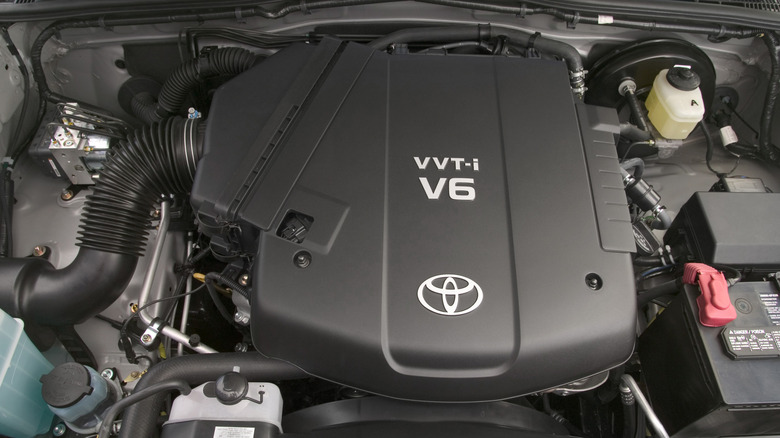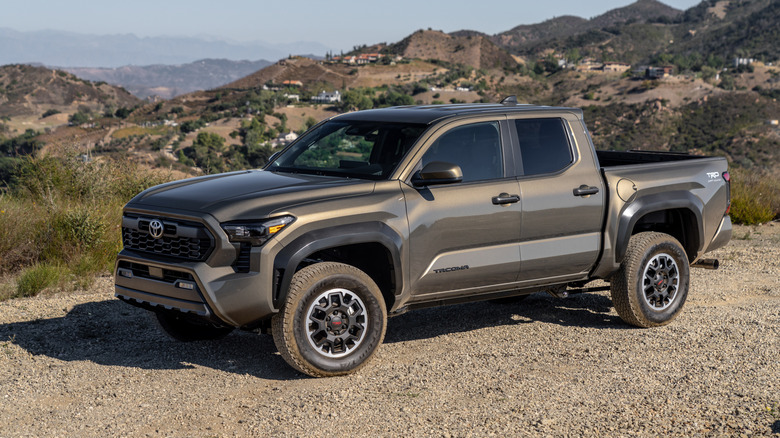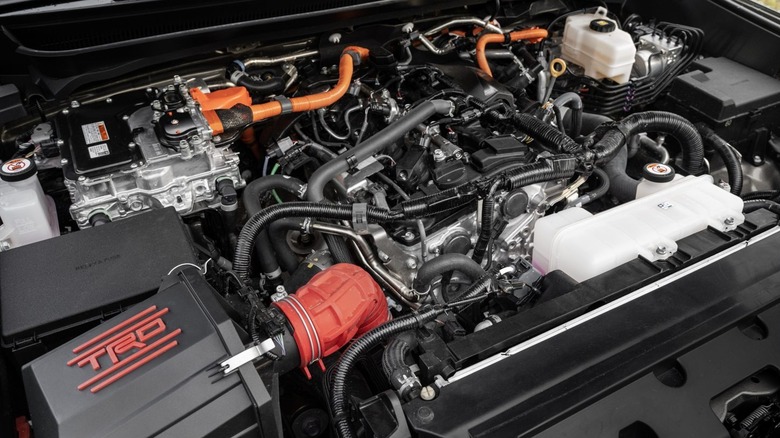Toyota Is Quietly Moving Away From The V6 Engine (And That's Not Surprising)
With so many major changes happening across the American auto industry in recent years, it's now Toyota that offers what's probably the most diverse vehicle lineup in America. It has everything from small, fuel-sipping hatchbacks like the Prius and Corolla to family minivans and full-size body-on-frame trucks and SUVs like the Tundra and Sequoia.
But despite its steadfast commitment to building sedans and compacts that other automakers have abandoned, and Toyota's more conservative approach toward EVs, the company has not been without major changes under the hood of its vehicles. Over the last few years, the once ubiquitous Toyota V6 engine has all but disappeared from the brand's lineup. At the time of writing, there just only two Toyota-badged vehicles that offer a V6 engine in America, the Tundra and Sequoia.
This major shift away from the tried and true V6 is by no means unique to Toyota. While Toyota hasn't clearly stated why it's phasing out the V6, the change follows other brands that have been replacing less fuel-efficient V6 engines with smaller displacement turbo or hybrid four-cylinder engines in an effort to reduce emissions and improve fuel economy.
Bye bye V6, hello turbos and hybrids
The place where Toyota's move away from the V6 has been most noticeable is under the hood of the latest Tacoma and 4Runner. For decades, the Tacoma and 4Runner were available with V6 engines that were beloved for their simplicity and reliability, even if they didn't have flashy horsepower numbers. But beginning in 2024 for the Tacoma and 2025 for the 4Runner, the old V6s have been replaced with new turbocharged 2.4-liter four-cylinder engines (with optional hybrid power on higher trims).
Looking at some of Toyota's other current models that have replaced their V6 engines with turbocharged or hybrid four-cylinder engines, you have the Camry, which dropped its V6 engine option when it moved to an all-hybrid lineup for the 2025 model year. The Sienna minivan dropped its old 3.5-liter V6 in favor of a 2.5-liter hybrid engine beginning in 2021, and the Highlander crossover replaced its standard 3.5 V6 with a 2.4-liter turbo four beginning in the 2023 model year.
In an ironic twist, the only two Toyota vehicles that currently offer a V6 engine in the American lineup, the full-sized Tundra pickup and Sequoia SUV, are both recipients of recent engine downsizing themselves. Except that in both SUVs' cases, Toyota replaced their old, naturally aspirated 5.7-liter V8s with 3.4-liter twin-turbocharged V6s for the current generation.
Can Toyota maintain its reputation for reliability?
When talking about Toyota's company-wide engine strategy, it's also worth mentioning Lexus. Though Lexus too has been gradually shifting away from V6s toward turbos and hybrids, you can still get Toyota's traditional 3.5-liter naturally aspirated V6 in the Lexus ES and IS sedans, as well as the RC coupe. Though with these models all scheduled to be either discontinued or heavily updated soon, the days of the 3.5-liter Lexus are numbered as well.
Beyond any changes to performance or fuel economy, the biggest effect of the company moving away from the naturally aspirated V6 is the potential risk of upending Toyota's longstanding reputation for reliability. So far, it's too early to make any conclusions about how dependable the new turbocharged four-cylinder engines are. However, for the 4Runner and Tacoma at least, it will certainly be hard to beat the reliability ratings of their previous iterations. If the new turbocharged four-cylinders can match the old engines on that front, it would be a huge accomplishment for Toyota's engineers. For now, though, time will tell if Toyota's reputation for bulletproof engines continues as we move into the post-V6 era.


